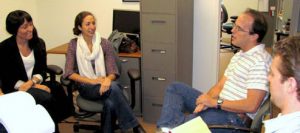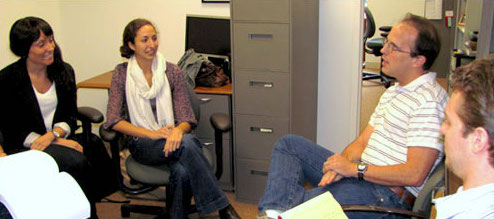By Julia Rist

Many Fordham psychology students have the opportunity to participate in lab groups. These groups offer a range of research topics, from neuropsychology to anxiety disorders.
One such group is the Compulsive, Obsessive and Anxiety Program (COAP). The lab is comprised of six doctoral students in the Clinical Psychology program, two students in the MA program, which focuses on clinical research methods and two undergraduate assistants.
Dean McKay, Ph.D., a professor in the Psychology Department at Fordham, leads COAP. McKay said that the research COAP conducts is extremely applicable to anyone who has anxiety or OCD.
“The emphasis is on research into the nature and treatment of obsessive-compulsive, anxiety and related conditions,” McKay said.
McKay is also the secretary and treasurer of the Coalition for the Advancement and Application of Psychological Science (CAAPS). The organization aims to create innovations in mental health treatment and research, while also fostering an acceptance of mental health illnesses.
“This coalition recently organized a large mental health summit, which brought together a diverse range of mental health professional organizations to work together toward shared definitions of evidence-based treatment, and how these disparate groups could work together to ensure the widest range of individuals have access to high quality, scientifically-based treatments,” McKay said.
McKay also said the coalition is working to develop models of evaluating when psychological interventions might cause harm, which he said is not routinely done now.
McKay said he and his team at Fordham conduct various research projects throughout the semester.
“Right now, there are projects on anxiety associated with political discourse, research on misophonia (selective sound sensitivity), and a developing project on trypophobia, which is a fear of holes that is considered connected to evolved fears of illness and disease,” McKay said. “We are also working on changes in brain activation following structured treatment for anxiety through our connection with a neuroimaging lab at Columbia.”
McKay said he took an interest in researching misophonia while attending a conference on Obsessive-Compulsive Disorder, which many patients also attended. There were several people there who reported extreme specific sound sensitivity, according to McKay.
“After some correspondence with other colleagues who were familiar with this problem, it became clear that this was a serious and debilitating condition,” McKay said. “We began developing a treatment program to evaluate shortly after.”
Misophonia is a selective sound sensitivity syndrome. People who have misophonia often react negatively when they hear specific sounds. These reactions can range from feelings of discomfort to having suicidal thoughts.
According to WebMD, these trigger sounds can be anything, but are often oral sounds, like noises made while eating.
Misophonia can sometimes be misdiagnosed as general anxiety disorder or OCD because of how symptoms present themselves in people who have these diagnoses.
In McKay’s study, he gathered data by measuring how severe the participants symptoms were by giving them an online trial. This trial was given to them regularly.
McKay said that the biggest challenge the COAP team encountered was making sure the participants took the test regularly.
Overall, McKay said the results of the study have been positive.
“At this point, we have preliminary support for our treatment program, and I’ve discussed these findings at a conference this past summer in Chicago, and will be discussing further at a conference next year,” McKay said.
McKay said that he plans on publishing this study. He also praised the COAP team’s efficiency in publishing their work.
“We have been publishing regularly,” McKay said. “The lab is highly active publishing research in professional journals.”
McKay said he hopes his research will add more insight into mental health. He said it is important to help people who have mental illnesses to learn to better cope and to live a happy and healthy life.
“Our aim is to disseminate research findings so providers can offer the highest quality care to their clients,” he said. “As an additional focus, the awareness of empirical work on the conditions we specialize in will also hopefully alleviate stigma.”













































































































































































































